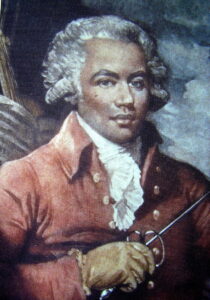Chevalier: Fact or Fiction?
The recent movie Chevalier tells the story of Joseph Boulogne, le Chevalier de Saint-Georges, a biracial composer, conductor, violin virtuoso, and athlete who lived c.1739-1799. Some sources state his birth year as 1745. My husband and I very much enjoyed the film when we saw it, but had some questions as bio-pics are notorious for taking liberties with their subjects’ life stories. With that in mind, I decided to do some sleuthing to see exactly how much screenwriter Stephanie Robinson altered the Chevalier’s tale – and got some surprises along the way. Note: if you haven’t seen the film yet, please be aware that spoilers abound in this piece!
The first thing in the script that raised our eyebrows was the scene in which the Chevalier joins Mozart onstage and they have a sort of “Battle of the Violins.” While plausible – the two men lived under the same roof in a ducal mansion for a time, so they may well have met – I’ve been unable to find any evidence of such a competition taking place. It’s still a fun scene, though, and Kelvin Harrison Jr. as Joseph and Joseph Prowen as Mozart look like they had a great time filming it. The script also refers to Mozart basing a villainous Black character in his next opera on the Chevalier – the opera, of course, is The Magic Flute and it’s quite possible that Monostatos was intended as a dig at a man Mozart saw as an enemy.
In the film, Queen Marie Antoinette bestows the Chevalier’s title on him, but apparently King Louis XV actually gave him that honor. However, Joseph and the Queen did know each other and she may have even accompanied him on fortepiano while he played his violin sonatas at private salons. It is true that three singers from the Paris Opera petitioned the Queen to bar the Chevalier from being made the director of that company because of his race, and that he once rebuffed the advances of a dancer (not, as the script depicts her, a singer), but the two incidents seem not to have been connected. The enmity between the Chevalier and Gluck is fictitious – the two men were on friendly terms with each other as well as Salieri and Gretry – but every movie needs an antagonist or two, right?
Was the Chevalier as successful with the ladies as the script would have us believe? According to my research, yes. In addition to his accomplishments in music and sports, he was a handsome man who was popular at court for a time, so he didn’t exactly lack for paramours. As in the film, he had an affair with a noblewoman that produced a baby and the woman’s husband had the child taken away and killed. However, she was a novelist, not a singer.
Eventually, as the film shows, the Chevalier soured on court life and he served in the French Revolution, even leading his own legion. What’s left out is that he was later jailed without specific charges, possibly because of his former friendship with Marie Antoinette, and was also accused of “counter-revolutionary” activities including (gasp!) making music. After his release, he continued to find solace in music and spent his remaining years in ill health, at least in part because he chose to ignore the symptoms of his bladder disease and an ulcer. He died on June 9, 1799, in the care of his friend and fellow officer Nicholas Duhamel. While not entirely true to life, Chevalier is an intriguing portrait of Joseph Boulogne and a welcome big-screen comeback for classical music.
Tags:Chevalier, Chevalier de Saint-Georges, classical music, fencing, horseback riding, Joseph Boulogne, Louis XV, Marie Antoinette, movie





